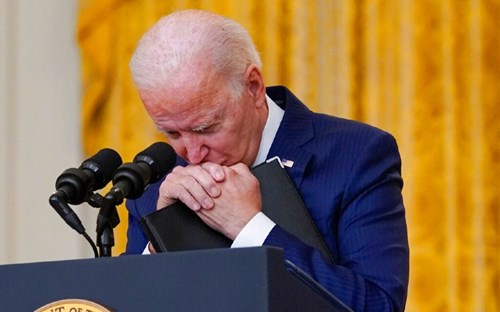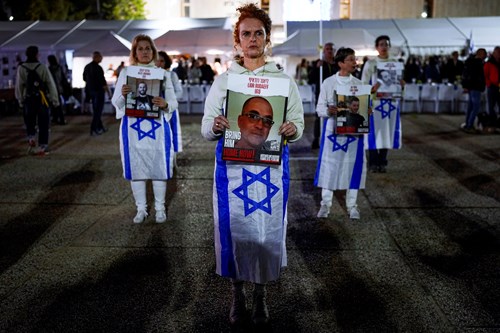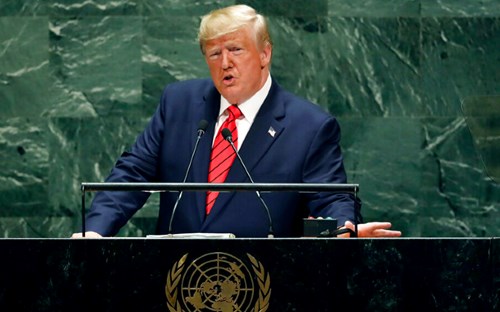Rebel groups who oppose Syrian President Bashar al-Assad have, in recent days, launched a two-pronged surprise attack on Aleppo, the largest city in the northern portion of the country.
 This is a coming together of two groups who oppose Assad but beyond that have different objectives, The Times of Israel reports.
This is a coming together of two groups who oppose Assad but beyond that have different objectives, The Times of Israel reports.
The best thing Biden can do, regional expert and publisher Joel Rosenberg said on American Family Radio Tuesday, is the opposite of his foreign policy decisions as it relates to war in Ukraine or pressure applied on Israel’s management of its wars with Hamas and Hezbollah.
Rosenberg's blunt advice for Biden is stay out of it.
Just when you thought things were quieter
As Israel has cobbled together a 60-day ceasefire in its war with Hezbollah on its northern border, it continues to root out Hamas in Gaza in the south where the terrorist group still holds hostages it kidnapped on Oct. 7, 2023.
Now Israeli officials are concerned that a potential overthrow of Assad could put in place an extreme Islamist Taliban-like regime that would bring instability to Israel’s northeastern border.

It’s too early in the conflict to identify the most advantageous foreign policy position, Rosenberg told show host Jenna Ellis.
“Generally, when your enemy is imploding or your enemies have turned on each other, you basically stay out and let them fight it out. Basically, Russia, Turkey, Syria, and Iran are sort of turning on each other right now,” he said.
Those four groups are jockeying to be in the best position to control Syria, Rosenberg said.
“I don't see an American move there. If there was ever an American first moment where you say, ‘Don't get involved in Syria (0:47) right now,’ maybe, (that’s now) because I can't see who the ally is,” Rosenberg said.
Rosenberg expects greater clarity from Trump’s policies regarding Israel. In fact, he’s seeing it right now even before Trump takes office, he says.
“The biggest move that Trump has made in the last 24 hours is to tell the Hamas terrorists in Gaza that there's going to be 'hell to pay' if they don't release these American hostages, much less all the rest of the hostages, by Jan. 20th,” Rosenberg said.
 In a blunt warning, the President-elect posted Monday on Truth Social saying there’s a lot of talk about the hostages, but nothing is being done to get them released.
In a blunt warning, the President-elect posted Monday on Truth Social saying there’s a lot of talk about the hostages, but nothing is being done to get them released.
That will change quickly if they’re still held against their will when he takes office, he says.
“Those responsible will be hit harder than anybody has been hit in the long and storied History of the United States of America. RELEASE THE HOSTAGES NOW!” Trump wrote.
He offered no details of his own plans, but the threat – without specifics – is very important, Rosenberg said.
“Don't focus on Syria and intervention in Syria right now. That's what a Biden administration would do. Focus first on getting Americans and our allies out of hostage captivity in Gaza and start to assert American force and leadership and determination.
“You’re seeing a lot of wicked regimes around the region tremble at the idea that Donald Trump is coming back, and they should. The threat is the exact right thing to do,” Rosenberg said.
Civil war fighting is back
Civil war in Syria has been on hold for many years, and this renewal has come with the approval of Turkey, Chris Mitchell, the Middle East bureau chief for CBN News, said on Washington Watch Monday.
“It’s the first time rebels have controlled Aleppo, and they’ve gone even farther south. They do represent a possible threat to the Assad regime,” Mitchell told show host Jody Hice.

Syria represents a key component for Iran’s plans in the region, Mitchell said. Currently, Iran uses Syria as a land bridge to supply weapons to Hezbollah.
The rebel groups are working during a vacuum that has been created as Israel has decimated Hezbollah, Mitchell noted.
“Right now Iran and Russia are fighting back against these rebel groups,” he advised.
 Hezbollah forces were key in pushing back the rebels in previous efforts to topple Assad in the Syrian Civil War in the 20-teens, Mitchell said.
Hezbollah forces were key in pushing back the rebels in previous efforts to topple Assad in the Syrian Civil War in the 20-teens, Mitchell said.
There’s not an immediate threat to Israel, Mitchell said, but Israeli Prime Minister Benjamin Netanyahu has said he’s monitoring events.
The U.S. has to strike a difficult balance in support of two allies right now, Rosenberg said.
12/5/2024 - Corrected date when Hamas kidnapped Israeli hostages.














